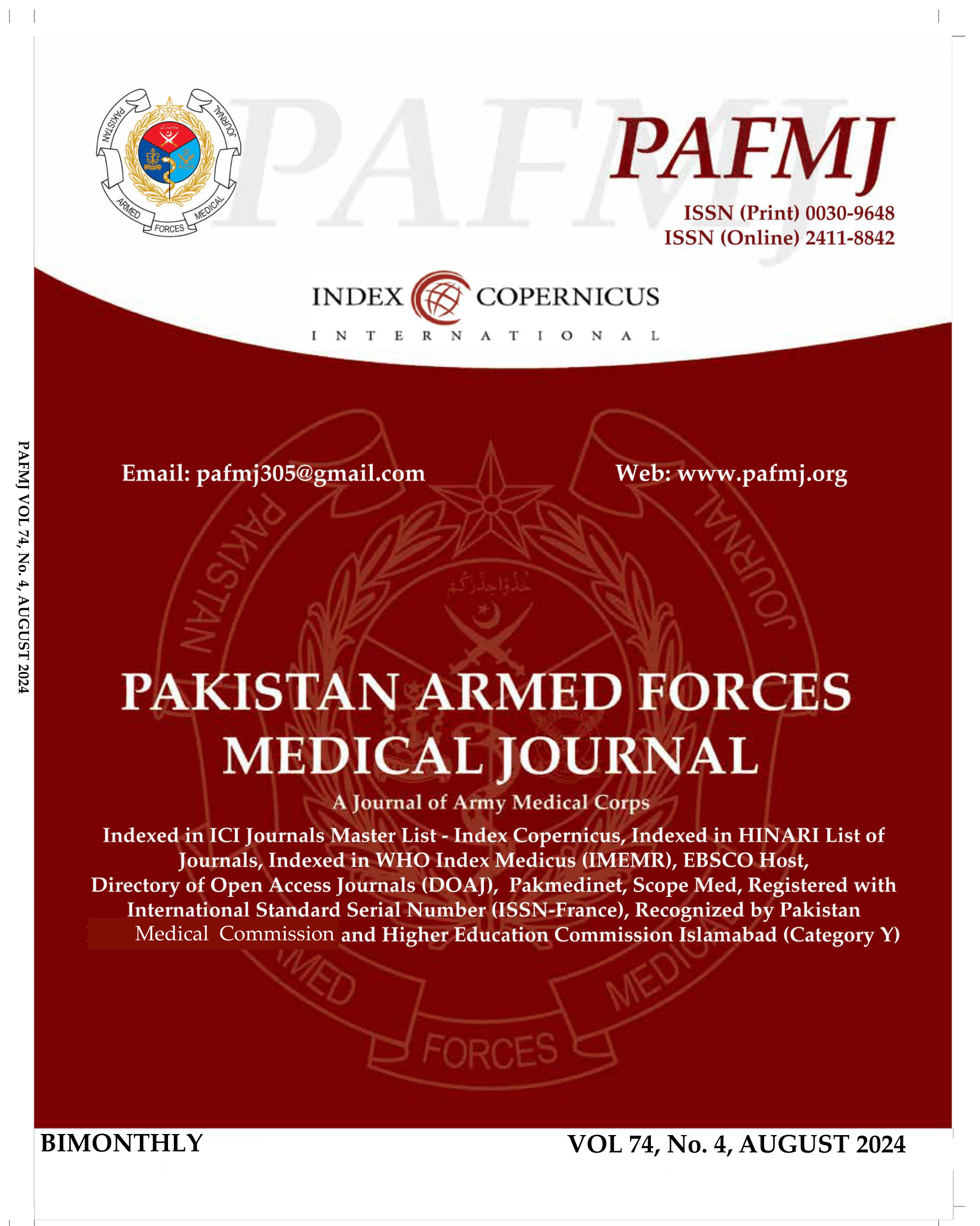Neutropenia: Frequency and Management Outcomes in Women with Breast Cancer Receiving Anthracycline Based Chemotherapy
DOI:
https://doi.org/10.51253/pafmj.v74i4.7770Keywords:
Anthracycline, Breast cancer; Granulocyte colony-stimulating factor, Neutropenia.Abstract
Objective: To analyse the frequency and management outcome of Neutropenia in women with breast cancer receiving Anthracycline chemotherapy.
Study Design: Comparative Cross-sectional study.
Place and Duration of Study: Oncology Department, Combined Military Hospital, Rawalpindi Pakistan, from Feb to Nov 2021.
Methodology: This study was conducted on 200 patients who have breast cancer who were put on an Anthracycline-based chemotherapy regimen. They underwent three or four cycles of chemotherapy as per the treatment plan. A complete blood picture was carried out on all patients after the cycle, and Neutropenia was graded according to the National Cancer Institute's Common Toxicity Criteria. Grade III and IV neutropenia patients were administered Granulocyte colony-stimulating factor and the response was observed.
Results: A total of 200 patients with breast cancer receiving Anthracycline-based chemotherapy were included. The mean age of the patients was 54.775±9.649 years. Seven hundred sixty-two cycles were recorded on these patients during the study period. Of these 762 cycles, 245(32.1%) episodes of Neutropenia were recorded. 60(24.4%) had either Grade III or IV neutropenia. Out of those having Grade III or IV neutropenia, 50(83.3%) had improvement after administration of G-CSF, while 10(16.7%) did not show any improvement. The advancing age of patients had a statistically significant relationship (p-value-0.001) with poor response to G-CSF treatment in our study participants.
Conclusion: Considerable number of post-menopausal patients with advanced breast cancer taking Anthracycline-based chemotherapy showed the presence of Neutropenia. G-CSF emerged as an effective treatment for high-grade Neutropenia in these patients.
Downloads
References
Siegel RL, Miller KD, Fuchs HE, Jemal A. Cancer Statistics, 2021. CA Cancer J Clin 2021; 71(1): 7-33.
https://doi.org/10.3322/caac.21654
Alkabban FM, Ferguson T. Breast Cancer. In: StatPearls. Treasure Island (FL): StatPearls Publishing; 2021.
Lüftner D, Schneeweiss A, Hartkopf AD, Muller V, Wockel A, Janni W, et al. Update Breast Cancer 2020 Part 2 - Advanced Breast Cancer: New Treatments and Implementation of
Therapies with Companion Diagnostics. Geburtshilfe Frauenheilkd 2020; 80(4):3 91-398.
https://doi.org/10.1055/a-1111-8775
Maajani K, Jalali A, Alipour S, Khodadost M, Tohidinik HR, Yazdani K. The Global and Regional Survival Rate of Women With Breast Cancer: A Systematic Review and Meta-analysis. Clin Breast Cancer 2019; 19(3): 165-177.
https://doi.org/10.1016/j.clbc.2019.01.006
PDQ Adult Treatment Editorial Board. Breast Cancer Treatment
(Adult) (PDQ®): Patient Version. 2021. In: PDQ Cancer Information Summaries. Bethesda (MD): National Cancer
Institute (US); 2002.
Heery M, Farley S, Sparkman R, Healy J, Eighmy W, Zahrah G, et al. Precautions for Patients Taking Aromatase Inhibitors. J Adv Pract Oncol 2020; 11(2): 184-189.
https://doi.org/10.6004/jadpro.2020.11.2.6
Ma RM, Chen CZ, Zhang W, You J, Huang DP, Guo GL. Prognostic Value of Chemotherapy-Induced Neutropenia at the First Cycle in Invasive Breast Cancer. Medicine 2016; 95(13): e3240.
https://doi.org/10.1097/MD.0000000000003240
Kim HS, Lee SY, Kim JW, Choi YJ, Park IH, Lee KS. Incidence and Predictors of Febrile Neutropenia among Early-Stage Breast Cancer Patients Receiving Anthracycline-Based Chemotherapy in Korea. Oncology 2016; 91(3): 274-282.
Bennett CL, Djulbegovic B, Norris LB, Armitage JO. Colony-stimulating factors for febrile neutropenia during cancer therapy [published correction appears in N Engl J Med 2013; 369(3): 293. Dosage error in article text]. N Engl J Med 2013; 368(12): 1131-1139. https://doi.org/10.1056/NEJMct1210890
Siddiqui T, Burney IA, Kakepoto GN, Khurshid M, Salam A, Smego RA. Lack of benefit of Granulocyte Macrophage or Granulocyte Colony Stimulating Factor in Patients with Febrile Neutropenia. J Pak Med Assoc 2002; 52(5): 110-120.
Hellemond IEGV, Smorenburg CH, Peer PGM, Swinkels ACP, Seynaeve CM, van der Sangen MJC, et al. Assessment and management of bone health in women with early breast cancer receiving endocrine treatment in the DATA study. Int J Cancer 2019; 145(5): 1325-1333. https://doi.org/10.1002/ijc.32205
Nounou MI, ElAmrawy F, Ahmed N, Abdelraouf K, Goda S, Syed-Sha-Qhattal H. Breast Cancer: Conventional Diagnosis and Treatment Modalities and Recent Patents and Technologies. Breast Cancer 2015; 9(Suppl 2): 17-34.
https://doi.org/10.4137/BCBCR.S29420
Shah AN, Gradishar WJ. Adjuvant Anthracyclines in Breast Cancer: What Is Their Role?. Oncologist 2018; 23(10): 1153-1161.
https://doi.org/10.1634/theoncologist.2017-0672
Yamanaka T, Matsumoto S, Teramukai S, Ishiwata R, Nagai Y, Fukushima M. Predictive value of chemotheraspy-induced neutropenia for the efficacy of oral fluoropyrimidine S-1 in advanced gastric carcinoma. Br J Cancer 2007; 97(1): 37-42.
https://doi.org/10.1038/sj.bjc.6603831
Mehta HM, Malandra M, Corey SJ. G-CSF and GM-CSF in Neutropenia.J Immunol 2015; 195(4): 1341-1349.
https://doi.org/10.4049/jimmunol.1500861
Gadisa DA, Assefa M, Tefera GM, Yimer G. Patterns of Anthracycline-Based Chemotherapy-Induced Adverse Drug Reactions and Their Impact on Relative Dose Intensity among Women with Breast Cancer in Ethiopia: A Prospective Observational Study. J Oncol 2020; 2020: 2636514.
https://doi.org/10.1155/2020/2636514
Chan A, Fu WH, Shih V, Coyuco JC, Tan SH, Ng R. Impact of colony-stimulating factors to reduce febrile neutropenic events
in breast cancer patients receiving docetaxel plus
cyclophosphamide chemotherapy. Support Care Cancer 2011; 19 (4): 497-504. https://doi.org/10.1007/s00520-010-0843-8
Bongiovanni A, Monti M, Foca F, Recine F, Riva N, Di Iorio V, et al. Recombinant granulocyte colony-stimulating factor (rG-CSF) in the management of neutropenia induced by anthracyclines and ifosfamide in patients with soft tissue sarcomas (NEUSAR). Support Care Cancer 2017; 25(1): 111-117.
https://doi.org/10.1007/s00520-016-3390-0
Wang T, Wu B, Hu X, Liu J, Zhang T, Li F, et al. A randomized multicenter phase II trial of mecapegfilgrastim single administration versus granulocyte colony-stimulating growth factor on treating chemotherapy-induced neutropenia in breast cancer patients. Ann Transl Med 2019; 7(9): 196.
Downloads
Published
Issue
Section
License
Copyright (c) 2024 Tahir Manzoor Lone, Muhammad Nadeem, Amjad Khan, Muhammad Umair, Misbah Hamid, Masaba Masood

This work is licensed under a Creative Commons Attribution-NonCommercial 4.0 International License.















